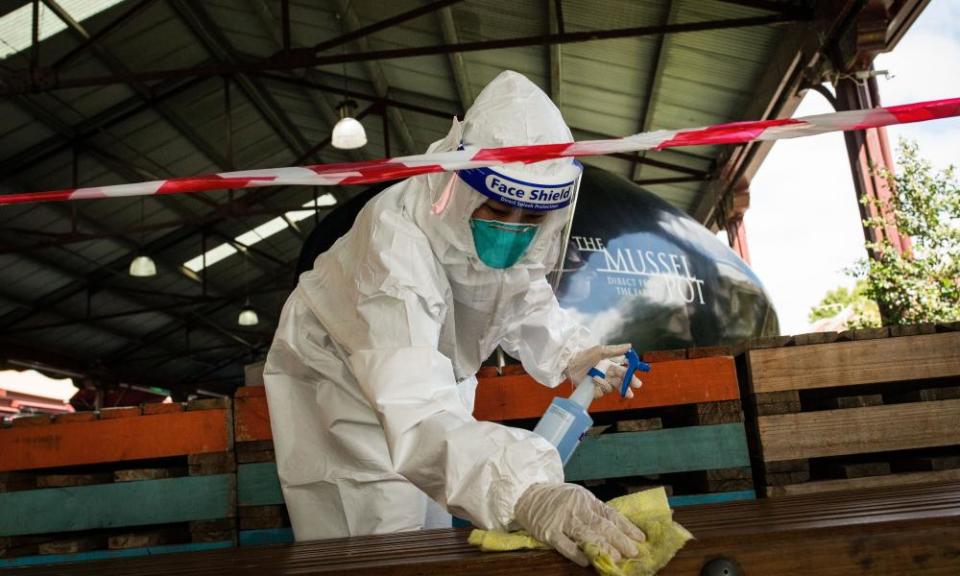Victorian government urged to drop deep clean mandates as businesses fork out thousands

Victorian businesses are handing over thousands of dollars for Covid-related deep cleans that infectious disease experts now say are unnecessary.
The Victorian government has been urged to drop deep clean mandates for businesses exposed to the virus as the state eases Covid-19 restrictions.
The state government updated its Covid-19 cleaning guidelines for workplaces last month in line with emerging evidence that surface transmission plays a “small role” in passing on the virus compared with shared air.
However, the Department of Health may require businesses to undertake a deep clean following exposure to the virus.
A CovidSafe deep cleaning rebate is currently available for small and medium-sized businesses visited by a suspected or confirmed Covid-19 case, capped at $10,000 or 80% of professional cleaning costs.
Related: Roadmap quirk allows unvaccinated Victorians to visit stores from Friday – but only for three weeks
Wild Life Brewing Co co-owner James Thomson said he received no explanation as to why his venue required a deep clean after becoming a tier 1 exposure site earlier this month.
“They didn’t give us any clarification on who the case was, and didn’t offer any solutions for a clean,” Thomson said. “You just get bombarded with every Covid cleaner in the state once you’ve been listed as an exposure site and don’t know if they’re accredited.”
Only the “highest risk” tier 1 exposure sites are currently listed on the Victorian government’s website in response to spiking Covid cases.
All businesses need a CovidSafe plan to open, and are required to clean high-touch surfaces with disinfectant at least twice daily. In the instances of a deep clean, a certificate of completion must be issued before a venue can reopen, in line with the health department’s cleaning guidelines.
A deep clean can be done in-house or via a contractor. But unlike routine cleaning, it must be undertaken by trained staff wearing personal protective equipment and using TGA-approved disinfectant.
Thomson said the Victorian government rebate helped, but the expense was still punishing for the hospitality industry after weeks of shutdown.
“In the end, the initial clean was $2,000 for our tiny 60 square metre venue,” he said.
“We were lucky there was the rebate and we’re only a bit out of pocket but we still have to find the money in a period we’ve been shut.
“If things were dire, that could be our sales representative’s wage … it’s a hard decision to make. You’d lean towards not reopening.”
James Cook University infectious diseases professor Emma McBride said deep cleaning didn’t “add much” over and above regular cleaning.
“I think it’s time to remove mandates for deep cleaning which appear to require expensive and specialised services … it’s unlikely to do anything over and above a good clean with disinfectant, which we can all manage,” she said.
“Respiratory viruses can be transmitted by direct touch, intermediate surfaces, droplets and aerosols.
“As time has gone on, the relative importance of each of these has become more clear. The virus doesn’t survive long on surfaces. Mask using blocks droplets and to some extent aerosol spread, and social distancing is good for avoiding direct contact and droplet spread.”
Related: See Australia’s state and territory Covid vaccination rollouts animated over time
But molecular virologist at the University of Queensland, Alexander Khromykh, said wearing masks and washing hands had been shown to be “more effective” in preventing the spread of the virus than deep cleans and disinfectants.
“In artificial laboratories, some studies found the virus can stay up to eight, nine days but in real scenarios, it’s more like three, and the risk is significantly lower after 24 hours,” he said.
“As for the risk of infection from touching surfaces, research invariably demonstrates it’s less than 1 in 10,000.
“Detergent cleaning is quite effective, in the case people are known to be infectious disinfectant would be helpful, but I don’t see the value of deep cleaning. And it won’t be needed at all if everyone is vaccinated.”
A spokesperson from the Department of Health said current deep cleaning requirements weren’t tier-based and were dependent on the setting.
“Where there is an outbreak, the department will provide public health advice that may include a number of measures such as testing and ventilation assessments in addition to deep cleaning,” the spokesperson said.
“This advice takes into account a number of factors, such as exposure time and in which industry the outbreak has occurred.
“The Department of Health is continuously reviewing and updating public health advice based on the most up to date public health direction.”

 Yahoo Finance
Yahoo Finance 